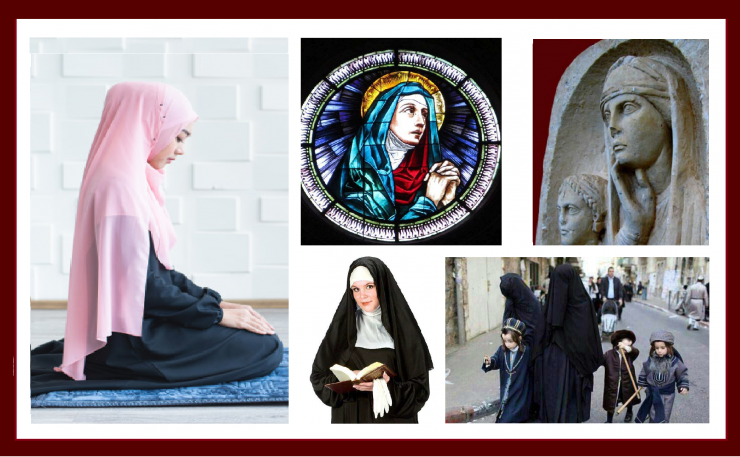Question: Why do Muslim women have to cover their hair and body while men do not?
As we all know, women and men are different as of nature. Even in the animals’ world, females are in demand, and males are nominees to be accepted by females. It is the law of nature. Women, due to their physical and psychological attributes, expect to be and are demanded by men.
In the Quran, the almighty God lists the most attractive beings in this world. It is a priority list both for men and women:
“Made alluring for humankind the love of passions (that come) from women, children[1], heaped-up gold and silver, blood horses, cattle[2], and crop. These are, however, the benefits of worldly life. The everlasting beautiful things to be aimed are in the presence of God.” (Al-e Imran 3:14)
As we can see, “women” are the first and the most alluring beings for both women and men. It is indeed noticeable in our daily lives that women are keener on having a remarkable impact on other women rather than men. In the Arabic language, unless there is a clue to think otherwise, the highest emphasis is on the first item of a list. So, according to this verse, women are more valuable than all types of wealth. It is evident that anyone with a sound mind would not leave his/her valuables in front of other people’s eyes but either hide or cover them for safety reasons. Thus, we can conclude that women, who are even more valuable than gold, must be covered in front of strangers’ eyes for their protection. Of course, God, who has created all human beings, knows their nature best and gives them the due commands:
“Tell the believing men to control their gazes and guard their private parts[3]. This is what will improve them. God is aware of the real face of whatever they do.
And tell the believing women to control their gazes and guard their private parts. Tell them not to uncover their beauty except what is naturally seen. Tell them to put a part of their headscarves onto their necks and not to display their beautiful parts except to their husbands, their fathers, their husbands’ fathers, their sons, their husbands’ sons, their brothers, their brothers’ sons, their sisters’ sons, their women attendants, the captives who they are guardians of, the males that have no more sexual desire to women, or children who are not yet aware of the private aspects of women. Tell them not to stamp their feet on the ground for their beautiful parts to be noticed. Believers! Turn to God altogether, so that you may attain what you hope for.” (An-Noor 24:30-31)
As we can see, the almighty God commands men to control their gazes and guard their private parts. Guarding private parts includes both covering them physically and refraining from any sexual sins. This is the part between the belly-button and below the knees. God commands men to remain chaste even before He commands women to control their gazes and cover themselves. Notice that God commands both men and women to keep their chastity. He begins with men because men are demanders, and they must demand women only in compliance with the rulings set by God. They must seek marriage and never approach unlawful sexual relations to live a peaceful and merciful life together with women. In the meantime, women must also control their gazes and keep chaste. They should not try to attract people’s attention to their beauty because they are themselves already natural means of allurement. They must cover their heads and bodies to be recognized as chaste and to protect themselves:
“Oh, Prophet! Tell your wives and daughters and other believing women to draw their broad headscarves[4] closer to themselves. That is more appropriate for them to be recognized (as chaste), and thus, not be discomforted. God is Forgiving and Beneficent.” (al-Ahzaab 33:59)“Thus righteous women are obedient (to God) and guard themselves (also) in the absence of witnesses in return for God’s protection.” (an-Nisa 4:34)
A woman who covers her body and head allows only the man of her choice to see her beauties, eliminating unwanted demanders.
FROM AN EGALITARIAN POINT OF VIEW
A more beautiful woman might be more advantageous than her less beautiful fellow if both expose their beautiful parts. This way, a woman might exploit her beauty to achieve any goal of hers, which would pose an obstacle to the equality of opportunity, both in daily life and business life. A woman covering her potentially beautiful parts would be valued and respected for her personality, thoughts, and actions in the first plan, rather than her physical attributes, which would provide fairness on any occasion.
QURAN IS NOT THE FIRST BOOK TO ORDER COVERING THE HAIR
From the ancient Assyrians to the Roman and Greek Empires, from Buddhism to Judaism, the headscarf symbolizes chastity for women in all eras and religions.
We can find in ancient Assyrian legislative texts that Mesopotamian women had to cover their heads. As for Judaism, we can still see Jewish women covering their heads and bodies. In all ancient carvings or illustrations of Mother Mary, we see that she is wearing a headscarf.
The Quran, the final divine book that attests confirmation to the previous divine scriptures[5], also commands women to cover their head and body just like the previous scriptures.
BECAUSE RELIGION IS NATURE
The natural order that God has established on the earth is in perfect harmony with the commands He has decreed in His books. God has set the order and then has sent divine books as guides to be followed in order to maintain and preserve this natural order since the beginning of the world. This is the direct relation between creation and religion:
“Direct your face directly to this religion, the natural order (fitra) set by God. He has created humankind in accordance with it. There is nothing to replace that which God has created. That is the upright religion, but most people do not know.” (The Romans 30:30)
All commands of God comply with human creation. They regulate our lives in the way we will be comfortable mentally and physically both in this world and in the afterlife. Covering her beauties and protecting herself from strangers’ eyes is the natural need of a woman, which she will discover if she listens to herself.
[1] The word “baneen = بنين” in the verse refers both to daughters and sons. We can clearly see this in verse below: “God has granted you spouses from among yourselves, and granted you children (baneen) and grandchildren by means of your spouses.” (an-Nahl 16:72)
[2] The word “an’am = أنعام”, translated as “cattle”, is the general name for sheep, goat, bovine, and camel of both genders (see al-An’am 6:143-144).
[3] The word “farj = private parts” is defined as “the openings between the legs and the area surrounding them” (Taj al-Arus). The example of Prophet Muhammad and his words clarify the extent of the surrounding area. Together with “farj”, they are called “awrah”: “The thigh is ‘Awrah” (Tirmidhi, Adab, 43, h.n:3027).
“Ibn Jarhad informed me from his father, that the Prophet (PBUH) passed by him while his thigh was exposed, so the Prophet (PBUH) said: ‘Cover your thigh, for indeed it is ‘Awrah'” (Tirmidhi, Adab, 43, h.n:3028).
The thigh may exclude the knee-caps, but there is controversy on this matter. To be on the safe side, covering the area between the navel and under-knees is recommended.
[4] The word translated as “broad headscarf” is “jilbab”. A woman covers her head and chest with it (Lisan al-Arab). The very same word is also used to refer to outer garments. In this verse, however, it is not possible to assign this meaning because outer garments are already close to a person’s body. A broad headscarf, rather than a regular headscarf, is more likely to flutter about unless it is drawn closer and fixed over the body, which may expose the breast, neck, and hair. The expression “more appropriate = أَدْنَى ” is a comparison between a regular headscarf that covers the neck along with the head and a broad scarf that also covers the chest. According to this verse, wearing a broad headscarf that also covers the chest is better than a simple one covering the head and neck.
[5] “(O Muhammad!) He has sent down to you the Book including the whole truth and confirming the previous ones. He had also sent down the Torah and the Gospel.” (Al-e Imran 3:3)
For further information on the relation between the Quran and previous divine books, please also read:
https://www.islamandquran.org/fatwas/the-quran-the-final-link-of-divine-revelation.html








Add comment